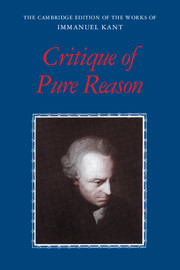Book contents
- Frontmatter
- Contents
- General editors' preface
- Acknowledgments
- Introduction
- Immanuel Kant, Critique of Pure Reason
- I Transcendental doctrine of elements
- Division two. Transcendental dialectic
- Book I On the concepts of pure reason
- Book II The dialectical inferences of pure reason
- Chapter I The paralogisms of pure reason (as in the first edition)
- Chapter I The paralogisms of pure reason (as in the second edition)
- Chapter II The antinomy of pure reason
- Chapter III The ideal of pure reason
- Appendix to the transcendental dialectic
- II Transcendental doctrine of method
- Editorial Notes
- Glossary
- Index
Chapter I - The paralogisms of pure reason (as in the first edition)
from Book II - The dialectical inferences of pure reason
Published online by Cambridge University Press: 05 July 2013
- Frontmatter
- Contents
- General editors' preface
- Acknowledgments
- Introduction
- Immanuel Kant, Critique of Pure Reason
- I Transcendental doctrine of elements
- Division two. Transcendental dialectic
- Book I On the concepts of pure reason
- Book II The dialectical inferences of pure reason
- Chapter I The paralogisms of pure reason (as in the first edition)
- Chapter I The paralogisms of pure reason (as in the second edition)
- Chapter II The antinomy of pure reason
- Chapter III The ideal of pure reason
- Appendix to the transcendental dialectic
- II Transcendental doctrine of method
- Editorial Notes
- Glossary
- Index
Summary
A logical paralogism consists in the falsity of a syllogism due to its form, whatever its content may otherwise be. A transcendental paralogism, however, has a transcendental ground for inferring falsely due to its form. Thus a fallacy of this kind will have its ground in the nature of human reason, and will bring with it an unavoidable, although not insoluble, illusion.
Now we come to a concept that was not catalogued above in the general list of transcendental concepts, and nevertheless must be assigned to it, yet without altering that table in the least and declaring it defective. This is the concept - or rather, if one prefers, the judgment - I think. But one will easily see that this concept is the vehicle of all concepts whatever, and hence also of transcendental concepts, and is thus always comprehended among them, and hence is likewise transcendental, but that it can have no special title, because it serves only to intraduce all thinking as belonging to consciousness. Meanwhile, however pure from the empirical (from impressions of sense) it may be, it still serves to distinguish two kinds of objects through the nature of our power of representation. I, as thinking, am an object of inner sense, and am called “soul.”
- Type
- Chapter
- Information
- Critique of Pure Reason , pp. 411 - 444Publisher: Cambridge University PressPrint publication year: 1998



